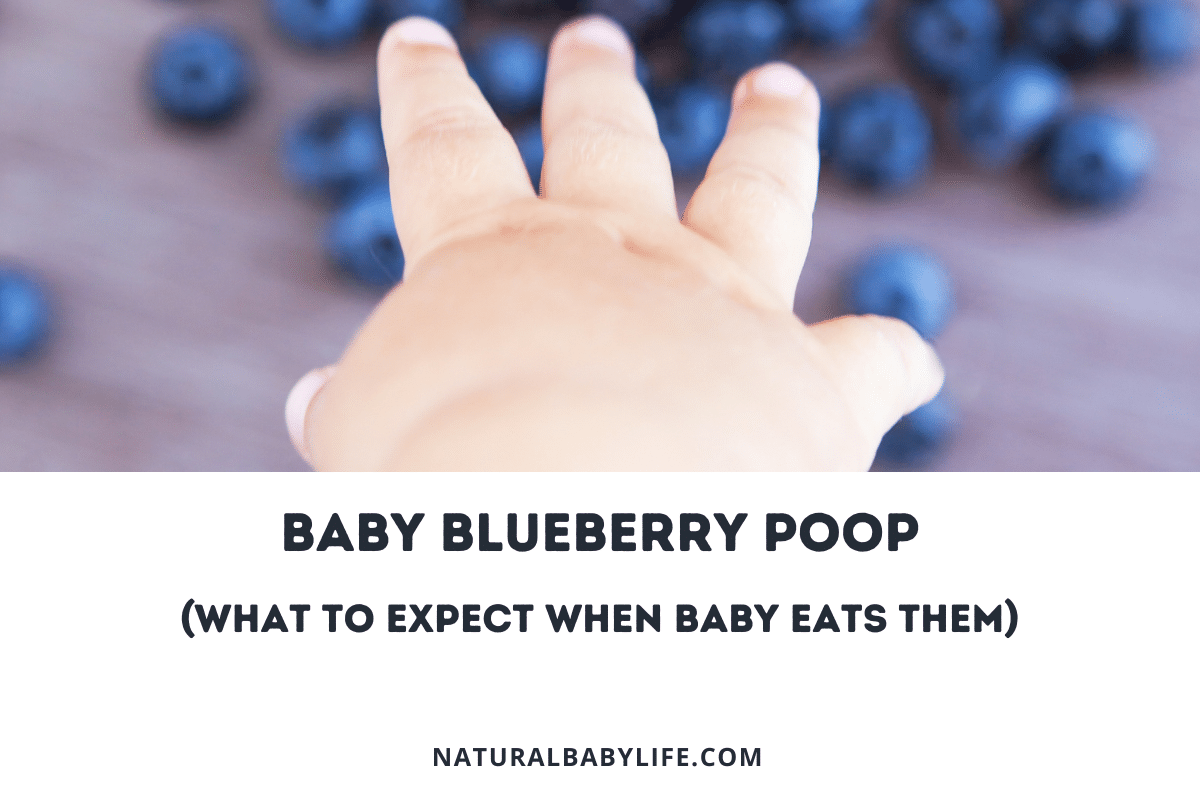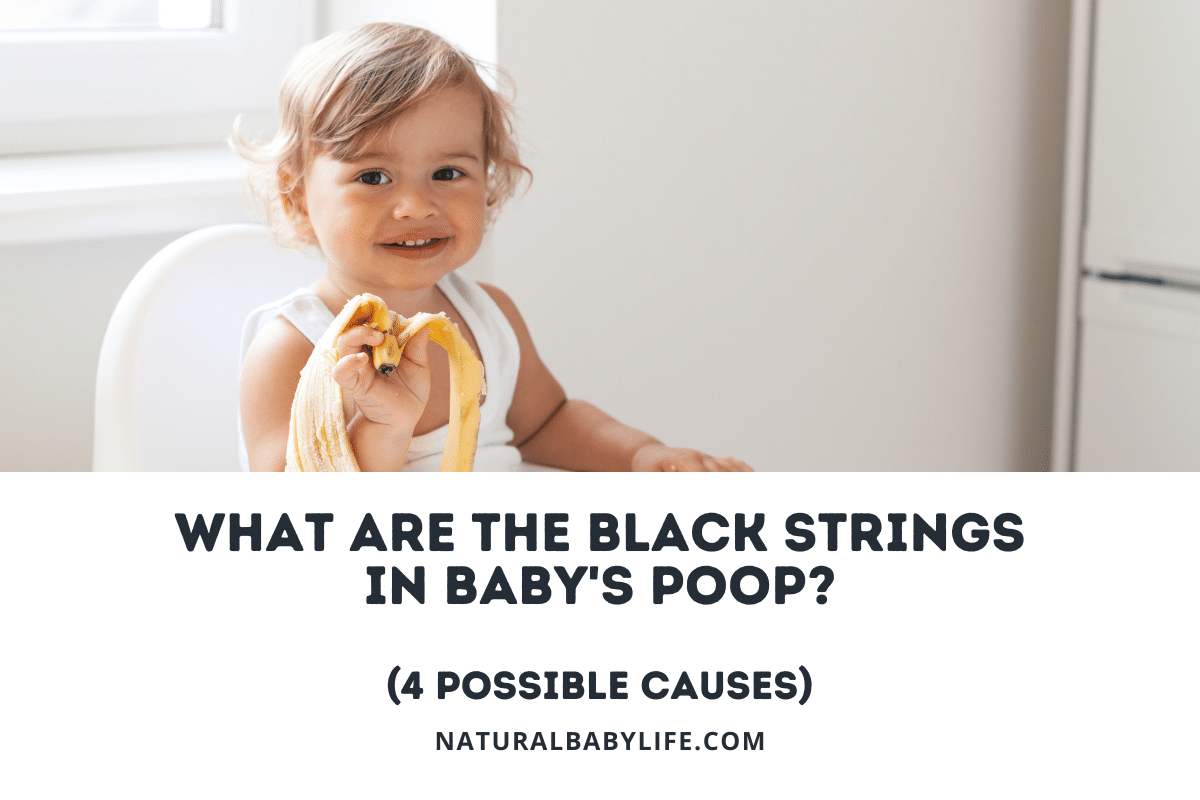If your baby is crying while pooping, it’s normal to feel concerned and wonder if something is wrong. Luckily, most problems babies have with pooping are pretty common, and naturally resolve themselves without the need for medical attention.
Why do babies cry when they poop? In most cases, babies cry when they poop because although they are able to create pressure to push the stool out, their immature digestive system causes them to strain because their anus still remains tight. Your baby might also be constipated, or have a difficult time passing a bowel movement in the position they’re in.
Even though it can be concerning when your baby seems to be uncomfortable, it’s actually pretty normal for babies to strain while pooping. Keep reading to learn about why your baby might struggle with pooping, and how to help them get feeling better.
Table of Contents
Why do babies strain while pooping?
In order to understand why babies strain while pooping, it’s important to keep in mind that infants are still developing and growing at an astounding rate. When a baby is born, their digestive system is still developing, even if they’re a full-term infant.
The digestive system consists of the liver, pancreas, gallbladder, mouth, esophagus, stomach, small and large intestines, and anus. A newborn’s pancreas, esophageal valve, and kidney are all underdeveloped at birth, which makes digestion difficult. Your baby’s digestive lining is also immature, which is why babies younger than 6 months should get their nutrition from either breastmilk or formula. Your baby simply doesn’t have the ability to properly digest other types of food. If your baby eats food their digestive system isn’t quite ready to handle, digestion and pooping can be an uncomfortable experience.
Not only is a baby’s digestive system still developing, but it hasn’t had much practice yet, either. That means that pooping, while natural and important, isn’t necessarily easy.
Your baby’s muscles need time to practice and perfect pooping, which explains why baby’s sometimes strain, grunt, or cry when they’re trying to poop.
Additionally, babies spend most of their early months lying down, where gravity can’t help them with their bowel movements. That means that their inexperienced abdominal muscles have to do even more work than they usually would.
Worn-out muscles are enough to make anyone feel a little grumpy! In fact, it’s actually pretty normal for babies to strain, squirm, and even turn red while they’re trying to poop. The motion and noises can help tighten your baby’s stomach muscles, which can make it easier for them to complete a bowel movement.
Constipation, especially in older children who have started solid foods, is another likely culprit for strained bowel movements. Babies and children who are constipated will have hard, pebble-like stools in addition to struggling with pooping.
When do babies learn to poop without straining?
While continuous straining during bowel movements is something that nearly all babies outgrow, occasional instances of constipation can occur throughout life. Luckily, if your baby is straining because of their developing digestive system, as they get older, their pooping will become more and more comfortable as their body matures.
At around 6 months of age, most babies have a digestive system that is mature and experienced enough that bowel movements should be well-regulated and more comfortable. If your baby is older than 6 months and still straining to poop, they’re most likely dealing with constipation.
Remember, however, that every baby is a little different and will develop into these milestones at slightly different times.
What is infant dyschezia?
Infant dyschezia is the medical term for the apparently painful pooping stage that many newborns go through. If your baby strains, yells, and cries only to pass a soft bowel movement, then they’re likely experiencing infant dyschezia.
Even though it sounds like a problematic medical condition, infant dyschezia is actually pretty common. It occurs because your baby’s anal muscles don’t relax when they’re supposed to when your baby is trying to poop. Your baby keeps pushing hard with their belly muscles and diaphragm, but their anus is still tightly closed. As soon as your baby is able to relax, they’re finally able to poop.
Infant dyschezia isn’t constipation; instead, it’s more like your baby’s muscles aren’t quite coordinated enough to poop efficiently. As your baby gets older and more experienced, they’ll outgrow this phase, and their bowel movements will become more comfortable.
Dyschezia vs constipation
| Infant Dyschezia | Constipation |
|---|---|
| Occurs in infants younger than 6 months | Usually occurs after starting solid foods (6 months or older) |
| Usually outgrown | Can happen at any age |
| Caused by developing muscles | Caused by digestive problems |
| Stools are soft and look normal | Stools are hard and pebble-like |
How many poops should a newborn do a day?
Although it depends on the baby, most newborns poop at least 1 to 2 times every day. In the first few weeks of their life, your newborn might even have as many as 5 to 10 bowel movements each day.
When they’re about a month old, your baby should settle into a pattern of pooping that is best for him or her. Your little one may go a few days between poops, or still have a bowel movement several times each day. As always, as long as your baby is healthy, growing well, and seems happy, there’s no need to worry.
What do you do when your baby cries while pooping?
When your baby is crying, you want to do everything in your power to help them feel better. As reassuring as it is to know that crying while pooping isn’t usually abnormal, you still want to comfort your baby. Here are some tips to try that should help your child start to feel better. As always, ask your child’s doctor if there’s something that you’re worried about.
Newborn cries when pooping and passing gas
If your baby is dealing with gas in addition to being uncomfortable while pooping, here are some things to try:
- Gas drops: Although they don’t work for every baby, gas drops are a good thing to try. They’re relatively cheap, and you can pick them up at any grocery store or pharmacy. Be sure to check with your baby’s pediatrician before you start any new medications, and always follow the dosing instructions. There are many kinds to choose from, so feel free to shop around and find the brand that works best for you and your baby.
- Nurse often: If your baby is breastfeeding, nursing more often can help calm your baby and comfort them. As your baby eats more often, you’ll also be able to help prevent large gas bubbles from developing in their tummy. Smaller meals more often can also help slow down the digestion system, minimizing gas. If you’re formula feeding, smaller meals more frequently can help minimize gas as well.
- Tummy time: Tummy time can help put some extra pressure on your baby’s digestive system, which means their little muscles don’t have to work quite so hard to process their food. Tummy time is also great for your little one’s development and motor skills, so it can be an important addition to your daily routine!
- Massage: Similar to tummy time, massaging your baby’s tummy can help their digestive system process their food. Infant massage can also help break up any big gas bubbles in their digestive tract.
- Stay upright: One of the best ways to get gas bubbles out of your baby’s tummy is to keep your child upright for about 30 minutes after feeding them. Staying upright helps any gas bubbles in your baby’s stomach rise up and out of their digestive system.
Baby cries when pooping but poop is soft
If your baby is crying and straining to poop but their bowel movement is still soft, they’re likely dealing with infant dyschezia. Here are a few things that might give your little one some relief:
- Let them cry for a bit: When babies cry or grunt while pooping, it’s not just because they’re uncomfortable. Crying actually helps put extra pressure on their tummies, which helps them to work their poop out. You can hold your crying baby and comfort them, but it’s good to know that their crying is actually helping fix the source of the problem.
- Wait it out: Infant dyschezia usually doesn’t last for more than a week or two, so the best treatment for this is to let your little one work on their bowel movements. Be sure to keep feeding your child often, and changing their diaper as usual. As long as your child is still eating well, growing, and has no other problems, things will normalize in a few days. If they’re still struggling after a few weeks, check with your pediatrician.
- Rectal stimulation: Taking your baby’s temperature using a rectal thermometer might give your little one some relief from infant dyschezia by helping their muscles relax. With this technique, however, you might end up making it harder for your baby to learn to relax their muscles on their own without help. Make sure you check with your doctor before trying this technique, as it should only be used if recommended to you by a pediatrician.
Baby is crying when pooping after starting solids
If your baby is crying and straining to poop after they’ve started solids, you’re likely dealing with constipation. Constipated poop usually looks like hard and pellet-like, and can be very uncomfortable for your baby to deal with. Luckily, there are several things that you can try to help make your child more comfortable:
- Karo syrup: A common home remedy for infant constipation is a little bit of Karo syrup. You can add 1 tsp of Karo syrup to 4 ounces of formula, and use up to twice a day until your baby’s poop looks normal. Be sure to watch your baby carefully to make sure they don’t show any signs of allergies, as Karo syrup is a corn product.
- Fruits and vegetables: If your baby has started eating pureed solids, then fruits and vegetables can help ease constipation. Prunes, in particular, are well-known for their ability to help get things moving. Anything that has fiber in it should help counteract both constipation and diarrhea, so fiber-rich fruits and vegetables are always a good addition to a healthy diet.
- Juice: Although you don’t want the added sugars that come with your baby drinking a lot of juice, small amounts can help relieve constipation. Mixing pear, prune or cherry juice with water in a 1:1 ratio can help get your child’s digestive system moving without adding too much extra sugar into their diet. You can also mix the juice with a little bit of cereal. Be sure to only give your child a little bit of juice, preferably no more than a few ounces a day.
- Hydration: If your baby is older than 2-4 months, then a little bit of extra water can help with their constipation. At this age, most of your child’s hydration and nutrition should still be coming from breast milk or formula, so be careful not to give your baby too much water to drink. If their stomach is full of water, they’ll be less likely to eat as much nutrient-rich milk or formula.
- Massage: Rubbing on your baby’s tummy can help relieve constipation, and help your little one feel better all at the same time. Rubbing in small circles can help work out any digestive issues your child might have.
- A warm bath: If it helps your muscles feel better after a long day, then it makes sense that your baby would also benefit from a warm bath if they aren’t feeling well. The warmth of the water can help relax your child’s muscles, which can help them poop more easily. Be sure to test the temperature of the water: it should be warm, but not so hot that it will hurt your baby.
What food causes baby constipation?
Although it depends on the baby, there are some foods that are more likely to cause constipation than others. Here’s a short list of some common constipation-causing foods. If you’re ever worried about a specific food, feel free to check with your pediatrician.
- Rice cereal: Rice cereal can cause constipation for some babies. Good substitutions for rice cereal are oatmeal or barley cereal.
- Processed foods: If your child’s diet doesn’t have enough water and fiber, they’re more likely to experience constipation. White bread, cheeses, and highly processed foods are more likely to clog up your child’s digestive system.
- Trigger foods: Some babies and children are more sensitive to certain foods. Trigger foods are often fatty or spicy, and can vary from child to child.
- The ABC’s of constipation: Applesauce, bananas, and cereal can all cause constipation if eaten in large amounts. Because these are popular first foods, you’ll want to limit the amount you give to your child as they begin eating solid foods.
- Iron supplemented formula: Sometimes, too much iron in their diet can cause constipation in your formula-fed baby. If your baby seems constipated, check with your doctor and see if iron-supplemented formula might be the culprit.
Health and Safety Tips
Whenever you’re trying to help your child feel more comfortable, there are a few things to keep in mind:
- Be Smart: Although the internet is a great tool for new parents, make sure to double-check the remedies you find. Think about the advice you’re given and trust your instincts. If something doesn’t feel like it’s safe, then don’t do it!
- Be Aware: Keep in mind that your baby is just that: a baby. Don’t give them food they aren’t ready for developmentally. Some remedies that are perfectly safe for a five-year-old or an adult aren’t safe for your baby.
- Ask Your Doctor: If you’re worried about your baby, ask your doctor for help and advice. Even for something as common as gas and constipation, your doctor is there to help and support you. And if you think your child has a serious medical problem, don’t ever hesitate to get it checked out!
Does gripe water help babies poop?
Another common remedy for baby constipation and gas is gripe water. Most types of gripe water are a mixture of herbs and spices that help relax the muscles in your baby’s digestive system. Ginger and fennel are common ingredients in gripe water due to their effect on the digestive system. Ginger is a supplement that is useful for all kinds of digestive issues, and is often used as a remedy in early pregnancy to help minimize morning sickness. Fennel can also aid in digestion, as it helps the muscles in the gastrointestinal tract relax.
If you choose to use gripe water, be sure to read the ingredients carefully. Early forms of gripe water used to contain alcohol, which can be very dangerous for babies and children to consume. There are countless homemade recipes for gripe water available online, and your grandmother might even have a secret family recipe. If you’re not comfortable making your own gripe water, there are several safe alternatives available in most grocery stores and pharmacies.
In addition to helping with constipation, gripe water can also help eliminate gas and relieve some of the symptoms of colic. Check with you pediatrician for specific recommendations about brands, and always follow the dosing information provided on the packaging.
How do you massage a baby’s poop?
A good technique to help relieve discomfort from digestive issues is to give your baby a massage. Tummy massages not only help relax your child’s digestive muscles, but they also give you a chance for skin-to-skin contact with your baby. Physical touch is also a great way to help your baby relax and calm down if they’re feeling upset.
Although even lightly rubbing on your baby’s tummy can help them feel better, there are some special techniques to get the most out of the massage.
- Take a small spoonful of olive oil or lotion and rub it into your hands to warm it
- Place your hands on your baby’s tummy, right below his or her bellybutton.
- Massage the area around the belly button in a clockwise direction. Be sure to be gentle, and make sure your baby is comfortable and happy. Massage for at least 15 minutes.
You can also massage over your baby’s clothes, but the skin-to-skin contact can help calm your baby. Always make sure your baby is warm and comfortable, and that they’re enjoying the massage.
What if my toddler is straining and crying to poop but isn’t constipated?
If your toddler isn’t constipated but is still having a hard time pooping, your child might be withholding, or avoiding the urge to poop.
Sometimes, your child may not want to use the bathroom because they don’t want to stop playing, they’re away from home, or they don’t want it to hurt when pooping. Withholding can also occur if you’ve started potty training and your toddler is so worried about having an accident that they avoid pooping or peeing altogether.
Regardless of the reason why they’re withholding, when your child finally does poop, they may strain and cry because they’re uncomfortable. If your child is withholding, it can lead to constipation, and make them even less likely to want to have a bowel movement in the future.
It’s important to figure out what might be causing your child to dislike using the bathroom and work on the underlying cause. If your toddler is worried that pooping will hurt, add some fiber and liquid to their diet so that they won’t experience constipation. If your child doesn’t like using public restrooms, make sure they try to use the bathroom before you leave the house. If they’re nervous about potty training, go back to diapers for a few weeks and try again when they’re more comfortable.
Above all else, make sure you stay supportive. Be sure to congratulate your child on their positive efforts, even if the result isn’t quite there yet. Avoid punishing your toddler if they have an accident, because they may keep trying to avoid using the bathroom.










